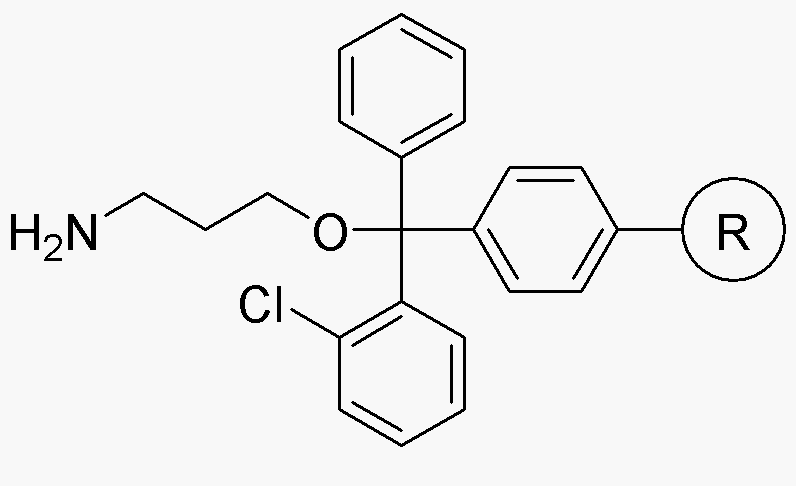b-Alaninol 2-chlorotrityl resin (0.2 - 0.4 meq/g, 200 - 400 mesh) is widely utilized in research focused on:
- Peptide Synthesis: This resin is an essential component in solid-phase peptide synthesis, allowing for efficient coupling of amino acids and facilitating the production of complex peptides.
- Drug Development: It is used in the development of pharmaceutical compounds, aiding in the creation of targeted drug delivery systems that enhance bioavailability and therapeutic efficacy.
- Bioconjugation: The resin serves as a platform for bioconjugation techniques, enabling the attachment of biomolecules to surfaces for applications in diagnostics and therapeutics.
- Analytical Chemistry: In analytical applications, it helps in the purification and isolation of compounds, improving the accuracy and reliability of analytical results.
- Research in Material Science: The resin is explored in the development of new materials, contributing to advancements in nanotechnology and polymer science.
Información general
Propiedades
Seguridad y normativas
Aplicaciones
b-Alaninol 2-chlorotrityl resin (0.2 - 0.4 meq/g, 200 - 400 mesh) is widely utilized in research focused on:
- Peptide Synthesis: This resin is an essential component in solid-phase peptide synthesis, allowing for efficient coupling of amino acids and facilitating the production of complex peptides.
- Drug Development: It is used in the development of pharmaceutical compounds, aiding in the creation of targeted drug delivery systems that enhance bioavailability and therapeutic efficacy.
- Bioconjugation: The resin serves as a platform for bioconjugation techniques, enabling the attachment of biomolecules to surfaces for applications in diagnostics and therapeutics.
- Analytical Chemistry: In analytical applications, it helps in the purification and isolation of compounds, improving the accuracy and reliability of analytical results.
- Research in Material Science: The resin is explored in the development of new materials, contributing to advancements in nanotechnology and polymer science.
Documentos
Hojas de datos de seguridad (HDS)
La SDS proporciona información de seguridad completa sobre la manipulación, el almacenamiento y la eliminación del producto.
Especificación del producto (PS)
La PS proporciona un desglose completo de las propiedades del producto, incluida la composición química, el estado físico, la pureza y los requisitos de almacenamiento. También detalla los rangos de calidad aceptables y las aplicaciones previstas del producto.
Certificados de análisis (COA)
Busque certificados de análisis (COA) ingresando el número de lote del producto. Los números de lote y de partida se pueden encontrar en la etiqueta de un producto después de las palabras "Lote" o "Lote".
Número de catálogo
Número de lote/lote
Certificados de origen (COO)
Este certificado de origen confirma el país en el que se fabricó el producto y también detalla los materiales y componentes utilizados en él y si se deriva de fuentes naturales, sintéticas u otras fuentes específicas. Este certificado puede ser necesario para cumplir con las normativas aduaneras, comerciales y regulatorias.
Número de catálogo
Número de lote/lote
Hojas de datos de seguridad (HDS)
La SDS proporciona información de seguridad completa sobre la manipulación, el almacenamiento y la eliminación del producto.
DownloadEspecificación del producto (PS)
La PS proporciona un desglose completo de las propiedades del producto, incluida la composición química, el estado físico, la pureza y los requisitos de almacenamiento. También detalla los rangos de calidad aceptables y las aplicaciones previstas del producto.
DownloadCertificados de análisis (COA)
Busque certificados de análisis (COA) ingresando el número de lote del producto. Los números de lote y de partida se pueden encontrar en la etiqueta de un producto después de las palabras "Lote" o "Lote".
Número de catálogo
Número de lote/lote
Certificados de origen (COO)
Este certificado de origen confirma el país en el que se fabricó el producto y también detalla los materiales y componentes utilizados en él y si se deriva de fuentes naturales, sintéticas u otras fuentes específicas. Este certificado puede ser necesario para cumplir con las normativas aduaneras, comerciales y regulatorias.


